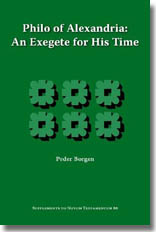
$38.00
Philo’s writings are a comprehensive and important source of late Second Temple Judaism. This volume gives important insights into his exegetical works. The structure of the books and their exegetical ideas are seen here as being closely connected, and his writings are analyzed against the background of the history, variety, and outlook of Alexandrian Jewry. Philo’s exegesis is a meeting place between Jewish and Greek notions and ideas; tensions are reflected, such as those between particularism and universalism, between specific biblical and historical earthly events and general macro- and micro-cosmic principles, and between heavenly ascents and interpreted history and eschatology. In addition, glimpses are gained of community life in a Hellenistic Jewish community, especially of issues on the borderline between Jews and their non-Jewish surroundings. New Testament material illuminates Philo’s broader Jewish context, and in turn Philo sheds light on New Testament backgrounds.
Peder Borgen, Ph.D., Dr. Theol., is Professor and Senior Research Fellow at the Department of Religious Studies, the University of Trondheim, Norway. He has published extensively on Hellenistic Judaism and on the New Testament, including Bread from Heaven: An Exegetical Study of the Concept of Manna in the Gospel of John and the Writings of Philo (Brill).
“Peder Borgen has enriched the literature on Philo and on the New Testament over many years, and this latest volume is a valuable contribution toward the better understanding of Philo’s work.”
—R.Mcl. Wilson, <ahref=http://bookreviews.org/bookdetail.asp?TitleId=2753&CodePage=2753,916>Review of Biblical Literature
“I can recommend this monograph to everyone who is interested in Philo’s exegesis.… With this monograph Borgen has again shown that he belongs to the most prominent Philonic scholars of our time.”
—A. C. Geljon, Vigiliae Christianae
